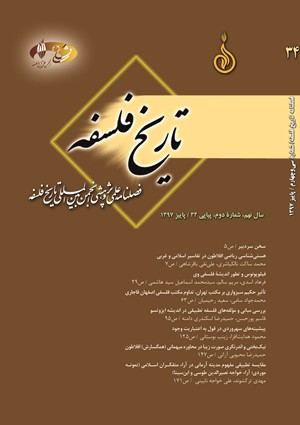هستيشناسي رياضي افلاطون در تفاسير اسلامي و غربي
محورهای موضوعی : اندیشههای حکمی و فلسفی ایران باستانمحمد ساکت نالکياشري 1 , علينقي باقرشاهي 2
1 - دانشگاه بينالمللي امام خميني
2 - دانشگاه بين¬المللي امام خميني (ره) قزوين
کلید واژه: افلاطون واقعباوري هستيشناسي فلسفه رياضي تمثيل خط معماي بناسراف ملاصدرا ,
چکیده مقاله :
ياضيات همواره از علوم يقيني شمرده ميشده است، اما اينکه معرفت رياضي دربارة چيست، همواره دغدغه ذهني رياضيدانان و فيلسوفان رياضي بوده است. اين نظريه که متعلقات رياضي، اموري مجرد و مفارق از جهان ذهن و انديشه ما هستند به افلاطون نسبت داده شده و عده زيادي از فيلسوفان واقعباور را با تمام اختلافنظرهايشان افلاطونگرا ناميدهاند. مفسران افلاطون، فلسفه رياضي وي را چه از لحاظ هستيشناسي و معناشناسي، چه از لحاظ معرفتشناسي بطور شفاف و سازگار تفسير نکردهاند و اين امر باعث بدفهمي فلسفه رياضي افلاطون و ابهام در کل فلسفه او گرديده است. از جمله، پريچارد، تفسيري از هستيشناسي افلاطون ارائه کرد که بموجب آن، متعلقات رياضي همين محسوسات هستند. بر اساس اين تفسير، تمثيل خط به گونه ديگري تفسير شده و ابهامات موجود در اين تمثيل از ميان ميرود. ما در اين نوشتار اين تفسير را بررسي ميکنيم و آن را با ساير تفاسير هستيشناسي رياضي افلاطون مقايسه كرده و آثار آن را در کل فلسفه رياضي افلاطون ملاحظه مينماييم و نشان ميدهيم فلسفه رياضي افلاطون برخلاف تفسير سنتي آن درگير معماي بناسراف نيست. بعلاوه، بر اساس استدلالهاي صدرالمتألهين نظرية مثل بلحاظ هستيشناسي نظريهيي کاملاً سازگار است؛ نتيجه اينکه فلسفه رياضي افلاطون فلسفهيي سازگار است.
Mathematics has always been considered to be among certain sciences; however, the objects of mathematical knowledge have continually occupied the minds of mathematicians and philosophers of mathematics. The theory stating that the objects of mathematics consist of a number of certain immaterial and separate affairs which are independent of the world of the human mind and thought has been attributed to Plato, and several realist philosophers who, in spite of all their differences, have been called neo-Platonists. Commentators of Plato have failed in providing any clear and consistent interpretation, whether in terms of ontology or semantics, of his philosophy of mathematics, which has resulted in some misunderstandings in this regard and some ambiguity in his whole philosophy. When completing his PhD dissertation at the University of Bristol, Paul Pritchard presented an interpretation of Plato’s ontology, according to which the objects of mathematics are the same sensible things. Here, the allegory of the divided line has been interpreted differently, and the existing ambiguities have been removed. In this paper, the authors have examined this interpretation and compared it with other interpretations of Plato’s ontology of mathematics. They also refer to its effects on Plato’s philosophy of mathematics in general and reveal that, unlike its traditional interpretation, his philosophy of mathematics does not conflict with Benacerraf’s identification problem. Moreover, the authors demonstrate that, based on Mulla Sadra’s arguments, the theory of Ideas is a completely consistent theory in terms of ontology and, thus, Plato’s philosophy of mathematics is a consistent body of philosophy.
ابنسينا، حسين بن عبدالله، الهيات من کتاب الشفاء، تحقيق حسن حسنزاده آملي، قم، مؤسسه بوستان کتاب، 1376.
بناسراف، پال، «صدق رياضي»، ترجمه ضياء موحد، از ارسطو تا گودل (مجموعه مقالههاي فلسفي منطقي)، تهران، انتشارات هرمس، 1389.
کاپلستون، فردريک، تاريخ فلسفه، ج1، ترجمه مجتبي مينوي، تهران، شرکت انتشارات علمي و فرهنگي و انتشارات سروش، 1380.
مطهري، مرتضي، مجموعه آثار، ج7، تهران انتشارات صدرا، 1385.
ملاصدرا، الحکمة المتعالية في الاسفار العقلية الاربعة، ج2، تصحيح، تحقيق مقصود محمدي؛ باشراف استاد سيدمحمد خامنهاي، تهران، انتشارات بنياد حکمت اسلامي صدرا، چ1، 1380.
ملاصدرا، الشواهدالربوبية في مناهج السلوکية، تصحيح، تحقيق و مقدمه سيدمصطفي محقق داماد، باشراف استاد سيدمحمد خامنهاي، تهران، انتشارات بنياد حکمت صدرا، 1382.
وحيددستجردي، حميد، «لوجيسيزم و مسئله صدق در رياضيات»، فصلنامه فرهنگ (ويژه فلسفه)، پژوهشگاه علوم انساني و مطالعات فرهنگي، ش11، 1371.
Barker, S. F., Philosophy of Mathematics, New Jersey, 1954.
Foley, Richard, “Plato’s Undividable Line: Contradiction and Method in Republic”, Journal of the History of Philosophy, vol. 46, no. I, 2008.
Galileo Galilei, Dialogue Concerning the Two Chief World Systems, 1967.
Gallop, D., Plato’s Phaedo, Oxford, 1975.
Mueller, I.., “Ascending to Problems: Astronomy and Harmonics in Republic VII”, in Anton, 1980.
Plato, Complete Works, J. M. Cooper and D. S. Hutchinson (ed.), Indianapolis: Hackett (Related books abreviated as Tim., Rep., Meno and Phaedo in citation), 1977.
Pritchard, Paul, Plato’s Philosophy of Mathematics, Academia-Verlag, 1995.
Ross, David, Plato’s Theory of Ideas, Oxford University Press, 1966.
Wedberg, A., Plato’s Philosophy of Mathematics, Stocholm, 1955.


